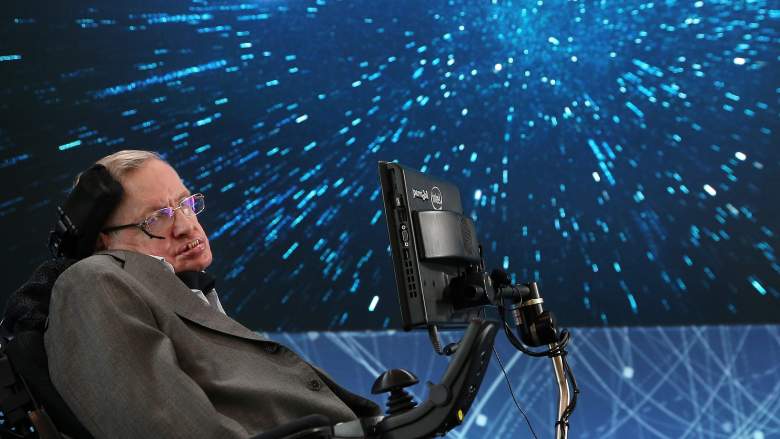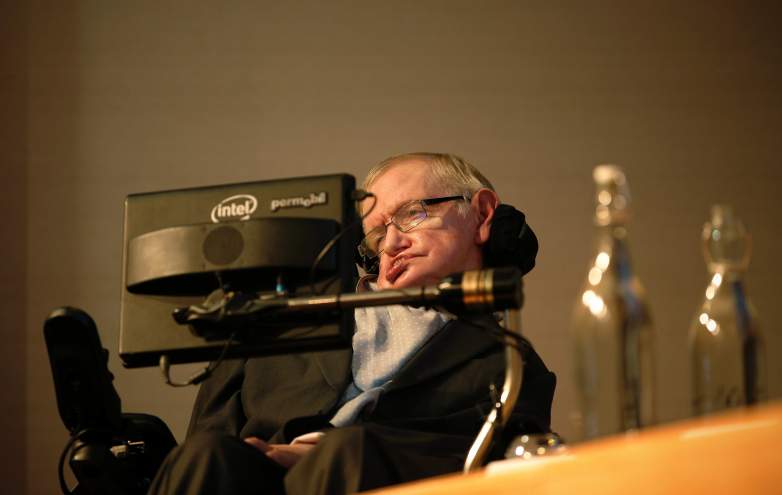
Stephen Hawking may have passed away, but his views on science and physics will be studied for decades to come. Arguably one of the most brilliant physicists in our recent history, Hawking taught us a great deal about cosmology and the unseen world around us. But what were his views on time travel?
First, let’s review time travel in an incredibly simplistic way. Thanks to Einstein, we know that time dilation is real thing. The faster someone travels and the closer they get to light speed, the slower time moves for them, while time continues to move at the same pace for people on Earth. Therefore, theoretically, someone traveling at light speed could come back to Earth and find that very little time had passed for them, compared to everyone else on the planet experiencing a hundred years or more. Of course, getting to light speed is a different matter entirely, requiring increasing energy the closer we get to c, until getting there becomes nearly impossible (and surpassing it requires infinite energy.) Light has found a workaround because photons (particles of light) are massless (and also function as waves.) But mankind has yet to find its own workaround. Meanwhile, traveling back in time is a different matter entirely, and scientists argue about whether it is theoretically possible or not. Here’s one argument for retrocausality, made in July 2017. (But here’s another thought experiment: Traveling back in time might come with a huge cost. Have you ever heard of “The Great Filter“? It’s the idea that there’s some catastrophic reason we’ve never seen aliens. One reason might be that the moment they create FTL, they also create time travel and somehow annihilate themselves. Not likely, but you never know.)
Now that we’ve gotten this very simplistic explanation out of the way, what did Hawking believe about time travel? Did he believe it was possible? It turns out, he had a lot to say. He believed some types of time travel were possible, but not all. Read on for a “brief history” of his views on the subject.
Traveling Back in Time Would Require Wormholes, But Hawking Believed Radiation Feedback Would Stop Their Creation
In 2010, he wrote an article published in Daily Mail about what would be needed to build a time machine. Everything, even time itself, has wrinkles and voids in it if you look close enough — down to the smallest of scales — he wrote. There are tiny tunnels in the quantum world that constantly form, disappear, and reform, linking separate places and even times. But they are far too small for a human to pass through. However, he wrote, it might be theoretically possible one day to capture a wormhole and enlarge it so a spaceship could pass through. “I’m not saying it can be done, but if it could be, it would be a truly remarkable device. One end could be here near Earth, and the other far, far away, near some distant planet.” In fact, a tunnel could even be in the same place, just separated by time.
However, he added, he doesn’t believe such a wormhole could exist because it would create paradoxes (such as someone going back in time and shooting himself before he creates a wormhole.) He wrote that some type of feedback would likely always happen to prevent these wormholes from existing or being created. “As soon as the wormhole expands, natural radiation will enter it, and end up in a loop. The feedback will become so strong it destroys the wormhole. So although tiny wormholes do exist, and it may be possible to inflate one some day, it won’t last long enough to be of use as a time machine,” he wrote. “So sadly, it looks time travel to the past is never going to happen.”
Interestingly, Hawking’s comments also seem to hint at the Great Filter theory. He said that warping space-time enough to travel back in time might “trigger a bolt of radiation that would destroy the spaceship and maybe the space-time itself.” In another interview, Hawking further insisted that even messages wouldn’t be able to be sent back in time.
Traveling Into the Future Is Possible Either By Using Gravity or Near-Light Speed, He Believed

GettyProfessor Stephen Hawking attends a press conference to announce a new award for science communication in London on December 16, 2015.
However, he did believe that time travel to the future is possible. In fact, he wrote, GPS has proven that. The mass of Earth “drags” on time. The closer you get to a black hole, for example, the stronger gravity becomes, making it a natural time machine. Time would slow down for people as they approached the black hole. However, this would be a dangerous method. So the alternative, as mentioned above, would be to travel near the speed of light (186,000 miles per second.)
Interestingly, Hawking believed that time slows down as you near the speed of light in order to protect the speed and make it physically impossible to ever break light speed. Interesting right? In his article, he mentioned that on a quantum scale, CERN does move particles near the speed of light. But it’s difficult for spaceships, as it would need huge amounts of fuel. However, Hawking posited, the slowing down of time could mean that theoretically, a human traveling near light speed really could reach the end of the galaxy within their lifetime.
He Threw a Party for Time Travelers But No One Came
Back in 2009, Hawking threw a party for time travelers, but he didn’t announce the party until after it happened. No one came. At least, that’s what he told everyone. (Some people still like to imagine that some people did show up, but he was sworn to secrecy.)
Want to see Stephen Hawking’s views on time travel? His series Genius covered time travel, and you can watch the hour-long episode from PBS below:
If you want to learn more about the basic concepts of space and time, as shared by Hawking, his book A Brief History of Time is still a great read.
